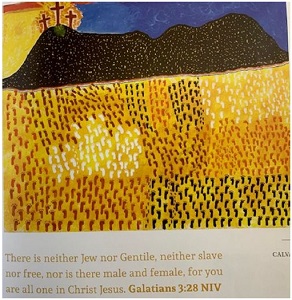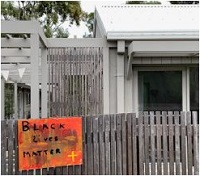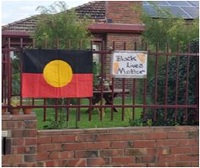A Pilgrim Liturgy
|
|
|
 |
|
|
Painting by Amari Tjalkuri |
|
| (Pitjantjatjara) |
Reconciliation
Lord God, bring us together as one,
reconciled with you and reconciled with each other.
You made us in your likeness,
you gave us your Son, Jesus Christ.
He has given us forgiveness from sin.
Lord God, bring us together as one,
different in culture, but given new life in Jesus Christ,
together as your body, your Church, your people.
Lord God, bring us together as one,
reconciled, healed, forgiven,
sharing you with others as you have called us to do.
In Jesus Christ, let us be together as one. Amen.
Last weekend some of us put signs, like those below, on our fence. It all got me thinking again about our rather sobering awareness of what true reconciliation takes.
Here are some learnings you may be able to develop further. They are learnings I have picked up and tried to apply:
- The process of reconciliation is always complex, but we all have to take what initiative we can. The initiatives we take should come from listening carefully, imagining together a better future and taking the actions that go in this direction.
- History Matters. The wounds of history must be acknowledged. When previous history has not been reconciled, trust is low. Building trust starts with those things asked. In our current circumstance, concerned by brutality by some police, it means returning to the unimplemented Royal Commission’s recommendations on Deaths in Custody.
 It also means insisting that the Statement of the Heart (from Uluru in 2017) is revisited with respectful openness to its implementation. Additionally, of course, it means research, services and advocacy to overcome structural inequalities.
It also means insisting that the Statement of the Heart (from Uluru in 2017) is revisited with respectful openness to its implementation. Additionally, of course, it means research, services and advocacy to overcome structural inequalities. - Peace and Reconciliation can face strange resistances. Remembering past wounds, people can become habituated to an “Us" versus “Them” identity. The whole narrative of a life may have to be re-imagined making room for a reconciled and reconciling future. Building trust means much persisting, much giving and forgiving. It means absorbing pain rather than passing it on...including the pain of having our reconciling initiatives resisted, even initially rejected. All this is to be expected. Additionally, we make mistakes even when well-intended. The many mistakes of apparently well intended people are part of the history too.
- Reconciliation is elusive. Reconciliation can seem quite fragile. The only way to sustain a reconciling new beginning is through a creative effort which is attentive and seeking to be grace-filled, taking every opportunity to deepen relationships and create real friendships.
- What we can offer, always contextually, is the Gospel of Jesus. For, as the retiring +John Sentanau reminds us from York, “the Gospel offers forgiveness for the past, new life for the present and hope for the future”.
We are accustomed to such sentiments but need to pause and take in the freedom this offers and the way forward it provides.
In February, just prior to the shutdown, I was in St John’s Cathedral Brisbane at the start of a WCC International Affairs Meeting. In his “welcome to country" the local elder gave thanks for the arrival of the Gospel through early missionaries, albeit in a package that included much we regret. He conveyed profound gratitude for how the Gospel freed his people from suspicions and endless retaliations.
When we were in Perth, our family was invited to go as witnesses on a journey up to Warburton, just south of the Gibson Desert. Two Aboriginal communities of Christian faith were reconciling matters from long ago. Organised by the WA Council of Churches, we went on a bus with Noongar people.
At Warburton we watched and prayed; sang Gospel songs with bluesy guitars; played football on the red desert soil with kids who ran like the wind and kicked the ball out of sight (and who arrived in cars without doors or a roof). The locals taught us how to hunt bush turkeys and cook the tail of a kangaroo (wrapped in silver foil). While we there, the then Federal Minister for Aboriginal Affairs, so to speak, flew in from Canberra to open something.
We watched with the locals as this plane arrived. The Minister got out in his suit and declared something “open”; got back in the plane and left. He was a very busy and important man. The people we were with, by contrast, were taking what time it took to bring a depth of healing to their relationships.
One does not want to make too much of a single incident, but reconciliation does take whatever time it takes. Knowing this is fact, we watch as world leaders rush into meetings over complex matters and leave before anything is really resolved. (For example, President Trump’s recent “meetings” with the N.Korean leader Kim Jong-un).
This parody of what reconciliation requires just brings into question the seriousness of the intent. Meanwhile, we are all placed at risk by such models of leadership in an era of weapons of mass destruction.
Currently, instead of some discreet and careful meetings between leaders of the Chinese Communist Party and other leaders, we watch clever young propagandists on TV, fanning these dangerous enmities.....
In the Gospel (Matthew 9:35 -10:8), we see Jesus profound compassion. The text, in the original language, tells us Jesus is moved to the very depths of his being by the plight of those vulnerable people.
This is our God.
Jesus “doing something about it" is the Cross in sacrificial, pure compassion.
In this reading, we see Jesus summoning those whose task it is to proclaim the compassionate, sacrificial love of God in word and deed. We stand in that line of people entrusted with this task.
As we continue our work of reconciliation, we pray for the grace to see people as Jesus sees them. We pray for the grace to persist with our responsibility as ministers of reconciliation.
Even these few cameos, stretching from “Black lives matter” to Australia’s international relationships, remind us of the work to be prayerfully done.
We understand therefore why Jesus said to the disciples: “The harvest is plentiful, but the labourers are few; therefore ask the Lord of the harvest to send out labourers into the harvest.”
A more compassionate Australia would be wonderful! Yes?
Bishop Philip Huggins,
NCCA President
Bishop Philip on YouTube:
Hearts of Compassion: Australian Faith Communities Respond to COVID19
This recording is also on the RSI webpage
Visit:
Listen on Youtube:
Hymn 10,000 Reasons https://youtu.be/IikiXah9OVM
Gradual- Fernando Ortega - Let All Mortal Flesh Keep Silence https://youtu.be/8wl4u8lnDQs
Amazing Grace (world choir) https://www.youtube.com/watch?v=BA7pdABvpnc
The Blessing Australia - Churches UNITE to sing The Blessing over Australia https://youtu.be/OOt7baaVSbE
Read:
The Statement from the Heart (Uluru, 2017)